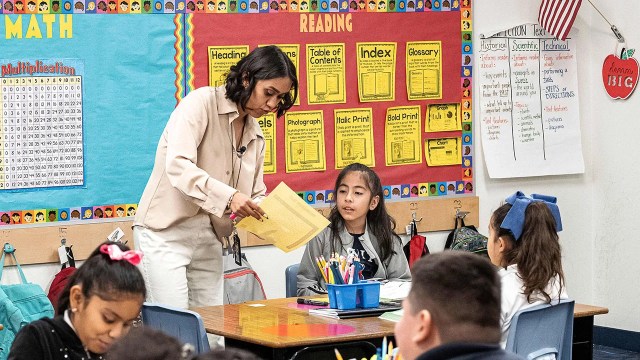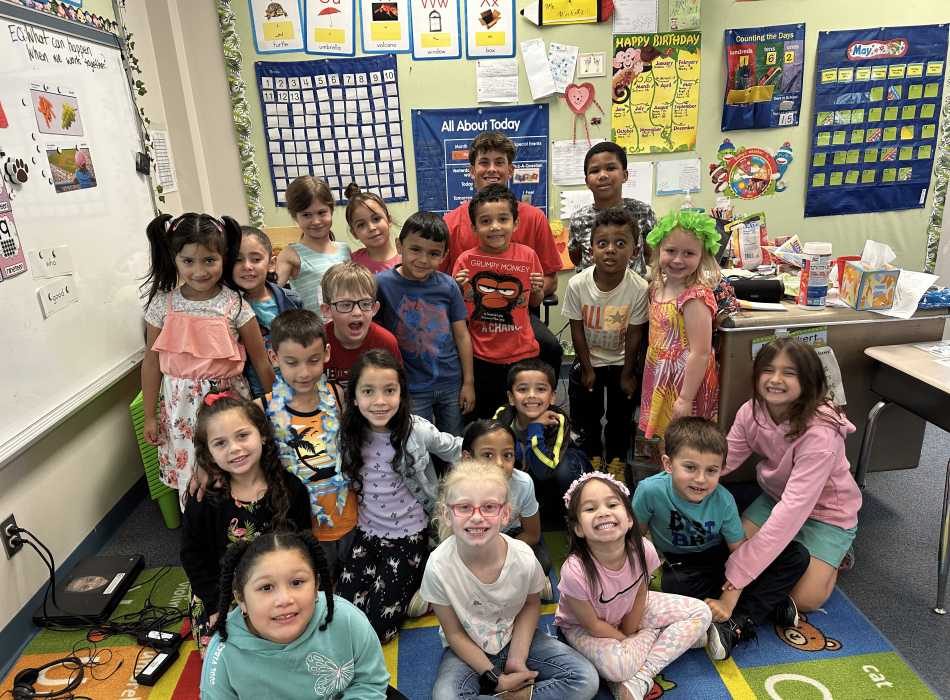Why play-based learning in Kindergarten supports early education
Wiki Article
Innovative Learning Activities in Preschool: Enhancing Abilities Via Play and Interaction
Innovative learning activities in kindergarten work as foundational experiences for young students (Grade School Peoria). These activities urge skill growth via spirited involvement and social interaction. Youngsters discover their imagination, improve communication, and learn valuable social abilities. Each experience contributes to their growth in one-of-a-kind ways. Recognizing exactly how these tasks form very early development exposes the profound influence of play in education. What specific elements make these experiences so efficient in supporting well-shaped people?The Function of Play in Early Childhood Growth
While lots of may underestimate the relevance of play, it works as a basic component of very early childhood advancement. Through play, youngsters explore their settings, foster social skills, and establish cognitive capacities. Participating in disorganized activities enables them to use their imagination, experiment with analytical, and boost their important thinking skills. Additionally, play gives a safe area for emotional expression, allowing youngsters to navigate their sensations and construct resilience.In addition, play encourages physical development as children take part in tasks that improve their motor abilities and sychronisation. Interaction with peers throughout play promotes team effort and interaction, laying the foundation for future connections. Kindergarten. Educators and moms and dads acknowledge that play is not merely a pastime but a crucial element of knowing, forming a kid's capability to thrive and adjust in different situations. Inevitably, play enhances kids's lives, preparing them for the challenges of the future while cultivating a lifelong love for learning
Innovative Arts and Crafts: Triggering Imagination
Creative arts and crafts play a considerable duty in stiring up children's imaginations and boosting their innovative abilities. These activities encourage self-expression through various tools, such as painting, attracting, and sculpting. By taking part in hands-on projects, kids discover to manipulate products, promoting great motor abilities and hand-eye sychronisation.Furthermore, imaginative arts give a system for problem-solving and critical reasoning, as youngsters explore different strategies and methods to their creations. This exploration allows them to experiment, choose, and gain from their experiences.
Partnership is another crucial facet, as kids commonly collaborate on group tasks, sharing sources and concepts. This interaction not just develops social abilities yet additionally nurtures a sense of neighborhood. Inevitably, imaginative arts and crafts act as necessary devices in a preschool setup, advertising cognitive, emotional, and social growth while stimulating the innate inquisitiveness and creative imagination of young learners.
Interactive Storytelling: Structure Language Skills
Interactive narration acts as a powerful device for developing language abilities in young children, as it engages them in the narrative process and urges energetic engagement. Via narration sessions, kids are welcomed to pay attention, react, and also add to the unfolding tale. This interactive style nurtures vocabulary advancement by exposing them to new words in context.As they take part, kids exercise necessary communication skills, such as expression and expression. They learn to sequence occasions, identify personalities, and understand the story, promoting critical reasoning. Additionally, interactive narration frequently includes aesthetic aids, audio results, and props, which further improve engagement and understanding.
Moreover, when youngsters share their own tales, they experience a sense of agency and creativity, reinforcing their language abilities in a helpful environment. Inevitably, interactive narration cultivates a love for language and literary works, establishing a solid structure for their future academic success.
Hands-On Science Experiments: Motivating Query
Hands-on science experiments provide young learners with invaluable opportunities to make inquiries and explore concerning the world around them. Engaging in simple, interactive experiments enables kindergarteners to ask concerns, make predictions, and observe results firsthand. These activities promote curiosity and foster a feeling of wonder, motivating kids to examine the residential or commercial properties of materials, reactions, and all-natural phenomena.For example, experiments such as planting seeds or mixing sodium bicarbonate and vinegar not only show scientific concepts yet also improve vital thinking skills. Youngsters find out to document their monitorings, advertising proficiency and numeracy as they measure, contrast, and document data. In addition, hands-on science promotes a development way of thinking, training resilience as they browse obstacles and learn from errors.

Collaborative Gamings: Promoting Team Effort and Social Skills
Taking part in collaborative video games supplies kindergarteners an unique platform to establish synergy and social skills while improving the inquiry-based knowing fostered by hands-on science experiments (Kindergarten). These video games urge youngsters to collaborate towards common goals, promoting communication and teamwork. As they navigate different difficulties, they find out to share duties, discuss functions, and fix disputes-- vital components of reliable synergyWith organized activities such as team challenges, relay races, or participating storytelling, youngsters not just enhance their social communications yet also strengthen their emotional intelligence. They get insights right into empathy and assistance, finding out that each youngster's contribution is beneficial. Additionally, these collaborative experiences promote a feeling of neighborhood within the class, developing bonds that prolong past individual play. By incorporating joint video games right into the curriculum, educators can lay the groundwork for vital life skills that will certainly profit children in their future instructional and social environments.
Regularly Asked Inquiries
How Can Parents Support Creative Discovering in the house?
Parents can sustain imaginative learning in your home by his response offering varied products, encouraging expedition, taking part in imaginative play, asking open-ended concerns, and cultivating a secure setting where children feel complimentary to express their ideas and creative thinking.
What Materials Are Ideal for Arts and Crafts Activities?
A range of products boost arts and crafts tasks, consisting of building and construction paper, scissors, adhesive, markers, paints, and recycled items. These resources inspire creative thinking and allow kids to explore their creativity with hands-on experiences.Exactly How Do Educators Examine Children's Creativity?
Teachers assess youngsters's creative thinking with observations, profiles of job, and flexible projects that motivate self-expression. They assess analytic skills, originality, and willingness to experiment, offering insights right into each kid's unique imaginative growth and capacities.What Are Some Examples of Outdoor Creative Activities?

Just How Can Cultural Motifs Be Integrated Into Creative Learning?
Social motifs can be incorporated into innovative discovering by integrating varied stories, music, art, and practices, encouraging kids to discover and commemorate numerous backgrounds, cultivating inclusivity and understanding while enhancing their creativity and cognitive skills.Children discover their creativity, enhance communication, and learn useful social abilities. With play, youngsters discover their environments, foster social skills, and develop cognitive abilities. Furthermore, play encourages physical development as kids involve in tasks that improve their electric motor Learn More abilities and coordination. Imaginative arts and crafts play a considerable function in stiring up kids's imaginations and improving see this page their imaginative skills. Interactive storytelling offers as an effective tool for developing language skills in young children, as it involves them in the narrative procedure and encourages energetic participation.
Report this wiki page